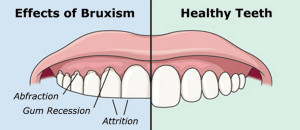
Teenage Academic Stress and Teeth Grinding

Teenage academic stress can lead to teeth grinding (Bruxism). For some teenagers, stress causes symptoms such as teeth grinding or jaw clenching, and these habits can potentially lead to serious dental issues if left untreated.
Causes of teeth grinding in teenagers
Although Bruxism can be caused by sleep disorders or an abnormal bite, stress is often the cause of teeth grinding in teenagers. Academic pressure can be a common source of stress and anxiety for many teenagers typically resulting from demanding schedules, heavy workloads, exams, deadlines, or grades. For some teenagers, this academic stress can manifest in the form of teeth grinding or jaw clenching.
Signs and symptoms of teeth grinding in teenagers
Because Bruxism often occurs during sleep, teenagers and parents may not be aware of the problem. For this reason, it is important to recognize the signs and symptoms of teeth grinding and speak to a dentist about concerns. These signs may include:
- Flattening of the teeth
- Tooth sensitivity to cold and hot due to the rubbing off of tooth enamel
- Tongue indentations
- Headache
- Jaw Pain
- Ear Pain
Complications related to bruxism in teenagers
Most teenagers grind their teeth or clench their jaws from time to time. This occasional Bruxism does not typically harm the teeth and often resolves on its own. However, when teeth grinding occurs on a regular basis, tooth damage and other oral health issues can result.
Destruction of enamel occurs with prolonged teeth grinding. This weakens teeth, causes sensitivity, and makes them more susceptible to decay. Not only can severe grinding cause damage to the developing teeth of teenagers, but it can even result in tooth loss and jaw disorders.
Temporomandibular joint disorder (TMD, TMJ) is a condition that can be caused or made worse by Bruxism. The temporomandibular joint is a hinge that connects the jaw to the bones of the skull. It allows for the up and down and side to side movement of the jaw. TMD refers to problems with the jaw and muscles that control it. Both teeth grinding and jaw clenching can put excessive pressure on the joint and cause the jaw muscles to tighten. Symptoms of TMD include jaw and facial pain or tenderness, problems opening the mouth or chewing, a clicking sound when opening and closing the mouth, or swelling. Depending on the severity, treatments can range from medication and night guards to surgery in extreme cases.
Treatment and diagnosis for teeth grinding in teenagers
A dentist can examine the teeth and jaw to determine if teeth grinding or jaw clenching is occurring and if treatment is necessary. Typically, treatment for Bruxism in teenagers is not needed. However, if the habit is causing signs and symptoms of dental problems such as excessive tooth wear or jaw pain, intervention may be necessary. The most common treatment is a thin plastic mouth guard, usually worn at night. The night guard protects the teeth from the effects of grinding and helps to prevent the grinding motion. When severe damage to the teeth has already occurred, bridges, crowns, root canals, or implants may be necessary.
Taking steps to alleviate the stress causing the teeth grinding is also extremely important for teenagers. Removing academic stress all together is not likely to be a possible solution, but there are a number of techniques to reduce tension and help the body deal with stress in a healthy way. Some ideas include:
- Exercise
- Yoga
- Meditation
- Massage
- Time management techniques
Please contact our office by Online Appointment Request or call 214 618 5200 if you would like to schedule an appointment.
